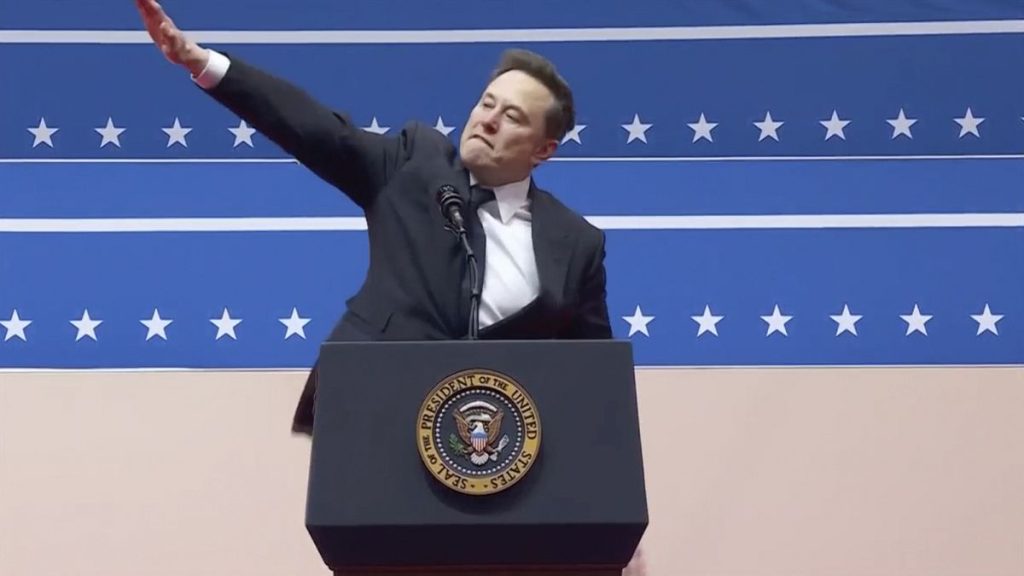Elon Musk’s controversial gestures at Trump’s inauguration rally, resembling a Nazi or Roman salute, ignited a firestorm of debate. While some dismiss them as spontaneous and insignificant, others see them as a deliberate evocation of fascist symbolism. The historical context of these salutes adds fuel to the controversy. The Roman salute, adopted by Mussolini’s fascist regime and later by Nazi Germany, became inextricably linked to totalitarian ideologies. Although lacking historical basis in ancient Rome, its association with fascism remains potent. The similar Bellamy salute, once used during the US Pledge of Allegiance, was abandoned due to its resemblance to these infamous gestures.
The salute’s modern usage is predominantly confined to neo-fascist groups and is outlawed in several European countries. Its continued presence in extremist circles underscores its enduring power as a symbol of hate and authoritarianism. Musk’s actions have drawn varying interpretations from historians and experts. Some argue that the direction of his gaze differentiates his gesture from a traditional Nazi salute, while others view it as a “masculine display of celebration” with ideological undertones, aligning with Trump’s “megalomaniac ideologies.” The ambiguity surrounding Musk’s intent leaves room for both condemnation and dismissal.
Despite the controversy, experts caution against labeling either Musk or Trump as fascists. While their rhetoric and policies may exhibit certain characteristics associated with fascist ideology, such as xenophobia and disregard for the rule of law, they lack the core elements of a fully formed fascist ideology aimed at establishing a new world order. The greater concern, according to some, lies in their contribution to the “de-liberalisation and dehumanisation of democracy.” This erosion of democratic principles, rather than outright fascism, poses the most significant threat.
The debate over Musk’s gesture extends beyond historical interpretations and delves into the realm of political opportunism and its potential consequences. Musk’s supporters and some organizations, like the Anti-Defamation League (ADL), have dismissed the gesture, drawing criticism from those who see it as a normalization of hate symbols. This divergence of opinion highlights the complexities of interpreting symbolic actions in a highly polarized political climate. The incident also raises concerns about the role of influential figures in inadvertently legitimizing extremist ideologies.
The ambiguous nature of Musk’s gesture has provided fodder for both sides of the political spectrum. While critics express alarm at what they perceive as a normalization of fascist symbolism, supporters dismiss the controversy as an overreaction. This polarization further complicates the issue, making it difficult to reach a consensus on the meaning and implications of Musk’s actions. The incident underscores the challenges of interpreting symbolic gestures in a charged political landscape, where perceptions are often shaped by pre-existing biases.
Regardless of intent, Musk’s gestures have galvanized neo-Nazi and white supremacist groups, who interpret them as an endorsement of their ideology. This unintended consequence underscores the potential dangers of ambiguous symbolic acts, especially when performed by influential figures. The incident highlights how easily such gestures can be appropriated and reinterpreted by extremist groups to advance their own agendas. This co-opting of Musk’s actions by hate groups further complicates the debate and raises concerns about the potential for escalating extremism. While Trump and his entourage may not embody full-fledged fascism, their actions, such as pardoning those convicted of assaulting police officers during the Capitol riots and their refusal to disavow extremist groups, raise concerns about the normalization of right-wing radicalization. This trend, coupled with ambiguous symbolic gestures like Musk’s, creates a climate conducive to the spread of extremist ideologies and underscores the fragility of democratic norms.

